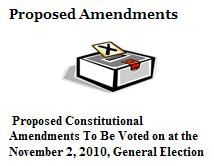 Question #2 is a fail for the General Assembly and Virginia. If the members were sincere in their concern for disabled veterans, they would have ponied up the funding required to offset the revenue losses at the local level. Most localities have already done the right thing; the GA hasn’t.
Question #2 is a fail for the General Assembly and Virginia. If the members were sincere in their concern for disabled veterans, they would have ponied up the funding required to offset the revenue losses at the local level. Most localities have already done the right thing; the GA hasn’t.
Ballot Question #1, much the initiative of Senator George Barker (D-39th), clarifies ambiguity in constitutional wording regarding property tax exemptions. Currently the standard for relief is an “extraordinary tax burden” and essentially leaves it to the General Assembly to define that measure. But the conditions for relief are better defined at the local level. Differences between localities are significant. This amendment essentially sanctions established local standards. The local standards include disabled veterans and generally have equitable exemptions in place.
“City and county governments welcome the flexibility to make those determinations if the amendment passes…Right now, it’s dictated by state law. These city and county governments are closest to it and much better able to make that judgment than 140 people sitting in Richmond.” – Neal Menkes of the Virginia Municipal League
On the surface, standards are surprisingly at variance. The City of Virginia Beach uses an annual household income of $63,450 and assets (excluding residence) of $350,000 for exemption limitations, while Augusta County’s standard is $32,000 and $75,000 respectively on much lower assessments and tax rates.
Ballot Question #2 would provide a blanket exemption from property taxes for all 100% disabled veterans. A generous gift by state legislators for which they neither have to pay nor account. Not a single member of the legislature could muster the courage to oppose this unnecessary initiative.
“Paul Galanti, state commissioner of the Department of Veterans Services, notes the second measure passed the required two consecutive General Assembly sessions without opposition.” – reported in The News Leader
But the The Daily Press reports local governments opposed the veterans’ amendment, another potential drain on city and county treasuries already strained by cuts in state funding and declines in collections of real estate taxes since the housing market collapsed in 2007.
“Rewards for military service are more proper for federal or even state governments. There’s no logical nexus between local taxes and the sacrifices veterans made. No city or county ever voted to send anyone off to war. If the state wanted to do something for veterans, it should do it with its own resources.” – Neal Menkes
There are three Virginia constitutional amendments on the ballot tomorrow. Two of them concern property taxes: one specifically designed to clarify localities’ authority to tax equitably; the other usurps local authority and applies a broad brush under the guise of protecting disabled veterans. One is even-handed; the other is pandering. One was set in motion by the genuine concern for clarity and equity; the other, a me-too initiative. Question #2 does nothing to improve the lot of disabled veterans who merit tax relief. It does allow legislators to pander to the military while avoiding the more difficult questions about why military members are becoming disabled while fighting unconstitutional wars.

![[UPDATED with Official Announcement] Audio: VA Del. Dan Helmer Says He’s Running for Congress in the Newly Drawn VA07, Has “the endorsement of 40 [House of Delegates] colleagues”](https://bluevirginia.us/wp-content/uploads/2026/02/helmermontage.jpg)
















